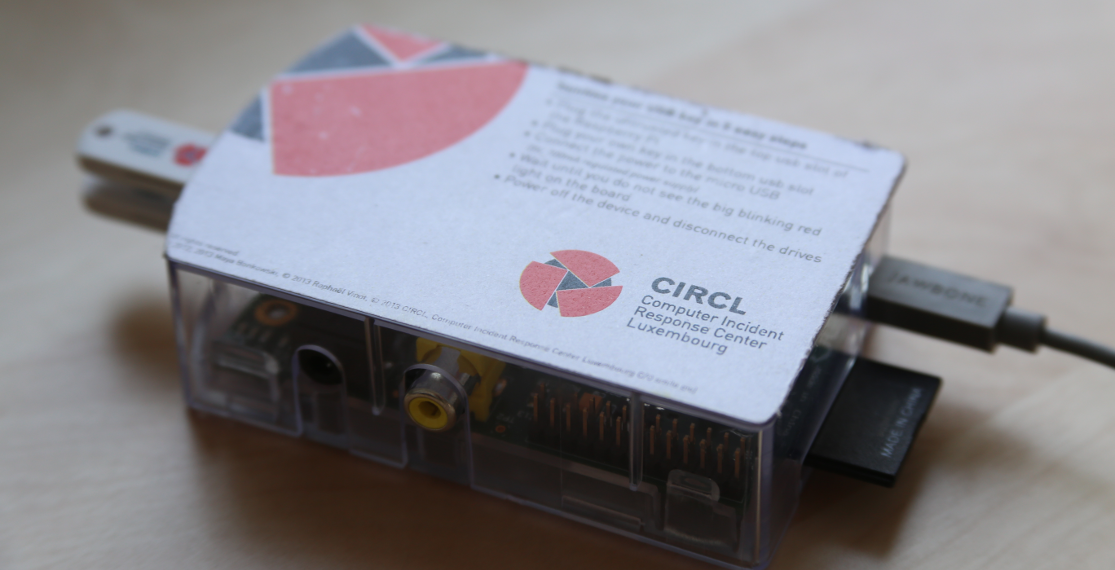mirror of https://github.com/CIRCL/Circlean
89 lines
3.5 KiB
Markdown
89 lines
3.5 KiB
Markdown
CIRCLean
|
|
========
|
|

|
|

|
|
|
|
How To
|
|
======
|
|
|
|
[Graphical how-to and pre-build image](http://circl.lu/projects/CIRCLean/).
|
|
|
|
To prepare the SD card on Windows, you can use [Win32DiskImager] (http://sourceforge.net/projects/win32diskimager/).
|
|
|
|
And the linux way is in the command line, via dd (see in copy_to_final.sh)
|
|
|
|
Why/What
|
|
========
|
|
|
|
This project aims to be used in case you got an USB key you do not know what is
|
|
contains but still want to have a look.
|
|
|
|
Work in progress, contributions welcome:
|
|
|
|
The content of the first key will be copyed or/and converted to the second key
|
|
following theses rules (based on the mime type):
|
|
- direct copy of plain text files (mime type: text/*)
|
|
- direct copy of audio files (mime type: audio/*)
|
|
- direct copy of image files (mime type: image/*)
|
|
- direct copy of video files (mime type: video/*)
|
|
- direct copy of example files (mime type: example/*)
|
|
- direct copy of message files (mime type: message/*)
|
|
- direct copy of model files (mime type: model/*)
|
|
- direct copy of multipart files (mime type: multipart/*)
|
|
- Copying or converting the application files this way (mime type: application/*):
|
|
- pdf => HTML
|
|
- msword|vnd.openxmlformats-officedocument.*|vnd.ms-*|vnd.oasis.opendocument* => pdf => html
|
|
- *xml* => copy as a text file
|
|
- x-dosexec (executable) => prepend and append DANGEROUS to the filename
|
|
- x-gzip|x-tar|x-7z-compressed => compressed file
|
|
- octet-stream => direct copy
|
|
|
|
Compressed files (zip|x-rar|x-bzip2|x-lzip|x-lzma|x-lzop|x-xz|x-compress|x-gzip|x-tar|*compressed):
|
|
- Unpacking of archives
|
|
- Recursively run the rules on the unpacked files
|
|
|
|
Usage
|
|
=====
|
|
|
|
0. Power off the device
|
|
1. Plug the untrusted key in the top usb slot of the Raspberry Pi
|
|
2. Plug your own key in the bottom usb slot
|
|
|
|
*Note*: This key should be bigger than the original one because the archives
|
|
will be copyed
|
|
|
|
3. Optional: connect the HDMI cable to a screen to see what happen
|
|
4. Connect the power to the micro USB
|
|
|
|
*Note*: 5V, 700mA regulated power supply
|
|
|
|
5. Wait until you do not see any blinking green light on the board, or if you
|
|
connected the HDMI cable, check the screen
|
|
it's slow and can take 30-60 minutes depending on how many document
|
|
conversions take place
|
|
6. Power off the device and disconnect the drives
|
|
|
|
Helper scripts
|
|
==============
|
|
|
|
You should use them as example when you are creating a new image and probably not
|
|
run them blindly as you will most probably have to change constraints accordingly to
|
|
your configuration.
|
|
|
|
IN ALL CASES, PLEASE READ THE COMMENTS IN THE SCRIPTS AT LEAST ONCE.
|
|
|
|
* proper_chroot.sh: uses qemu to chroot into a raspbian instance (.img or SD Card)
|
|
* prepare_rPI_builder.sh: update the system, add the repositories and install all
|
|
the dependencies needed to compile poppler and pdf2htmlEX on a rPi
|
|
* update_builder.sh: compile the latest version of poppler from debian experimental,
|
|
pull and compile the latest version of pdf2htmlEX from the git repository
|
|
* prepare_rPI.sh: update the system, install the dependencies of poppler and pdf2htmlEX,
|
|
install poppler and pdf2htmlEX (the deb packages compiled in the builder)
|
|
* create_user.sh: create the user who will run the scripts, assign the proper sudo rights.
|
|
* copy_to_final.sh: populate the content of the directory fs/ in the image,
|
|
contains a sample of dd command to write the image on the SD card.
|
|
*TAKE CARE NOT USING THE WRONG DESTINATION*
|
|
|
|
|
|
|